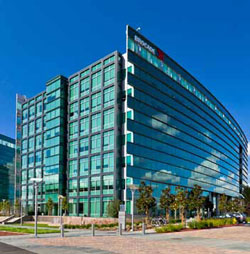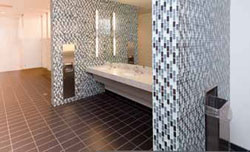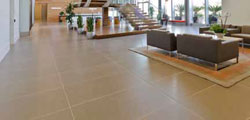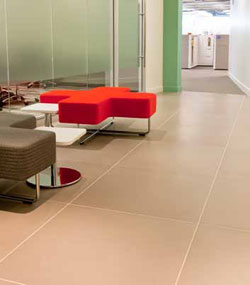
 “This project was submitted based on technical merit, which in this particular case, is focused on the large format tile that had yet to be used in the US at the time of installation. This award reflects the great partnership that DeAnza Tile and Custom® Building Products have built over the years,” said Rich Papapietro, president, DeAnza Tile.
“This project was submitted based on technical merit, which in this particular case, is focused on the large format tile that had yet to be used in the US at the time of installation. This award reflects the great partnership that DeAnza Tile and Custom® Building Products have built over the years,” said Rich Papapietro, president, DeAnza Tile.
In August 2010, Brocade Communications, a worldwide leader in networking solutions, unveiled its new corporate headquarters. The 562,000-square-foot campus, which accommodates more than 3,000 employees, includes two new office buildings, an advanced data center and engineering lab. Brocade recently earned a place on Information Week’s annual list of 500 most innovative business technology users in recognition of the data center’s sustainable design, energy efficiency and ingenious deployment of technology.
 The headquarters is also notable for the use of large format tiles for its interior flooring: 2-feet by 4-feet tiles for the first floor and 3-feet by 3-feet tiles for the second floor in the lobbies, hallways and landing areas. “The key to large format tile installations – especially with this large of tile – is substrate flatness and using the proper mortar,” said Clayton Peck, regional technical sales representative, Custom. Peck advised DeAnza Tile, the company that installed the tile, on technical product criteria and selection.
The headquarters is also notable for the use of large format tiles for its interior flooring: 2-feet by 4-feet tiles for the first floor and 3-feet by 3-feet tiles for the second floor in the lobbies, hallways and landing areas. “The key to large format tile installations – especially with this large of tile – is substrate flatness and using the proper mortar,” said Clayton Peck, regional technical sales representative, Custom. Peck advised DeAnza Tile, the company that installed the tile, on technical product criteria and selection.
“These were the largest tiles we’ve ever installed,” said Papapietro. “We were concerned about the flatness and tolerance of the tiles; variations are common among large format tiles.”
Custom delivered a complete solution to address the critical issues involved in the large tile installation.
“A major reason we were awarded the job was because of our partnership with Custom Building Products,” said Papapietro. “The Custom team was instrumental in helping us through the entire project. With Custom’s total solution and outstanding support, we were able to offer a single source solution with a 10-year warranty that exceeded the warranty requirements. Custom products are the only brand we’ve carried for more than seven years.”
 DeAnza Tile used EasyMat® Tile & Stone Underlayment for the underlayment. It’s a bonded system that does not break or uncouple from the substrate or the mortar/mat matrix. EasyMat allows for the use of a modified mortar, which was specified by Caesar Stone by Spec Ceramics, the maker of the large format tiles used in the installation. EasyMat also creates higher shear bond strength to both the tile and the substrate (450 psi vs. 210 psi).
DeAnza Tile used EasyMat® Tile & Stone Underlayment for the underlayment. It’s a bonded system that does not break or uncouple from the substrate or the mortar/mat matrix. EasyMat allows for the use of a modified mortar, which was specified by Caesar Stone by Spec Ceramics, the maker of the large format tiles used in the installation. EasyMat also creates higher shear bond strength to both the tile and the substrate (450 psi vs. 210 psi).
The architect agreed to switch to EasyMat because the competitive product originally specified for the job recommends ANSI A118.1 mortar and did not meet the specifications of the tile manufacturer. Caesar Stone by Spec Ceramics required ANSI A118.4 mortars to be used to adhere to the tiles, and EasyMat offers sound attenuation that the original mat did not.
 Custom’s ProLite® Tile and Stone Mortar was recommended and used for several reasons. Its non-slump features are ideal for supporting large format tile installations. It also helps address slight floor and tile irregularities and tile-to-tile adjustments, especially when there’s a large disparity between the grout joint size and the tile size.
Custom’s ProLite® Tile and Stone Mortar was recommended and used for several reasons. Its non-slump features are ideal for supporting large format tile installations. It also helps address slight floor and tile irregularities and tile-to-tile adjustments, especially when there’s a large disparity between the grout joint size and the tile size.
ProLite’s medium-bed characteristics also control shrinking during the curing process, which can contribute to loss of bond or mortar cracking as it hydrates. “Using a standard polymer-modified mortar can lead to problems or failures later on,” explained Peck. “ProLite is formulated for thicker application and maximum coverage that large format tile installations like the Brocade project demands. It has a creamier texture and easier trowel-ability onto the floor. ProLite’s lightweight and advanced handling characteristics help make spreading and overall handling easier — reducing labor time is important when tiles are so big that it requires two people to set a tile.”
“ProLite is formulated for thicker application and maximum coverage that large format tile installations like the Brocade project demand. It has a creamier texture and easier trowel-ability onto the floor. ProLite’s lightweight and advanced handling characteristics help make spreading and overall handling easier – reducing labor time is important when tiles are so big that it requires two people to set a tile.”
Another major consideration was that ProLite is formulated with recycled material, so it contributes to LEED® certification and exceeds ANSI A118.4 and A118.11 without the need for additives. Brocade was looking to achieve the highest green building standards possible, so this was an important issue from the onset of the project. The Brocade headquarters has since received LEED Gold certification by the U.S. Green Building Council for its high-performance green buildings.
San Jose, CA
Year Completed:2010
Architect:KHSA (Core and Shell) /RMW (Corporate Interiors)
Contractor:Vance Brown, Inc.
Tile Contractor:DeAnza Tile
CBP Regional Technical Representative:Clayton Peck
Copyright © CUSTOM Building Products 2026
Products | Resources | Interactive Tools | Warranties | Privacy Policy | Terms of Use | Technical Training